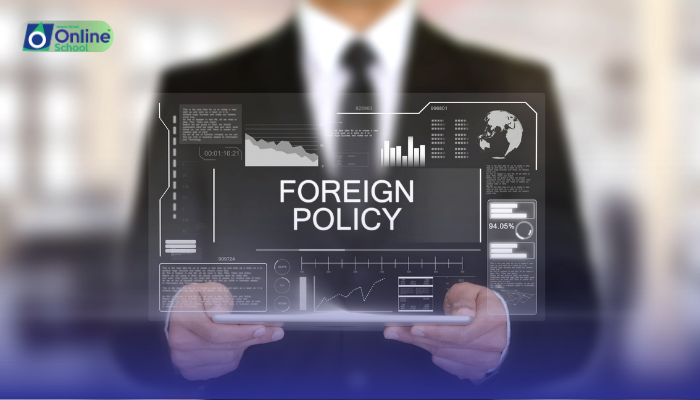
With the advancement of communication technology the world has virtually turned into a global village. No country, in the modern world, can survive independently and in total seclusion from other. Every state as a member of the comity of nations is bound to establish relations with other states. The policy a state adopts in the process of establishing relations with other states is called 'foreign policy', it has been defined thus: "The general plan of one country concerning its relations with other countries".
FUNDAMENTAL PRINCIPLES OF PAKISTAN'S FOEIGN POLICY
Our foreign policy is based on the following five fundamental principles:
i. Cooperation with the United Nations and other international agencies in maintaining world peace.
ii. Friendly relations with all nations of the world.
iii. Non-alignment.
iv. Fraternal relations with the Muslim countries.
v. Regional cooperation.
vi. Economic development.
AIMS AND OBJECTIVES OF OUR FOREIGN POLICY
Preservation of National Independence: The Muslims of South Asia struggled hard against the British and the Hindu hegemony, solely because they wanted to live like an independent and free nation. In order to safeguard her independence Pakistan had to fight two wars against India (1965 and 1971). Preservation of national independence has always remained the paramount principle of the foreign policy of our country.
Support for the Right of Self-determination for all Nations: In international forums Pakistan always rendered full support to the cause of the nations fighting for their right of self-determination and freedom from foreign subjection. Pakistan successfully supported the independence movements of the countries like Kampuchea, South Africa, Bosnia, Libya, Indonesia, Eritrea and a number of other Asian and African countries.
Pakistan has been giving unflinching and consistent support to the cause of independence of the people of Kashmir and the Palestine.
Promotion of International Cooperation: Pakistan became the member of the United Nations Organization in the very next month after its independence. As a member of the UN, Pakistan always supported the policy of resolving international disputes through negotiation. Pakistan used her good offices for conciliation among different countries of the world at many occasions. In this respect Pakistan's efforts as a member of "Muslim Ummah Aman Committee" to bring about cease-fire between Iraq and Iran during their long drawn out war needs special mention.
Non-alignment: Pakistan took birth in a bi-polar world, generally divided into the Socialist and the Capitalist blocks engaged in a cold war against each other. Since Pakistan fought its way to freedom on the basis of an ideology, based on the principles of Islam, it was not possible for us to become the blind camp-followers of either of the two ideological blocks. We always tried to establish cordial relations with all countries of the world, irrespective of their ideological affiliations. In 1979 Pakistan joined the NAM (Non-Aligned Movement) as a regular member.
Regional Cooperation: Pakistan has always strived hard to establish good-neighbourly relations with the countries of the religion. Pakistan entered into a pact with Iran and Turkey, which was known as the RCD (Regional Cooperation for Development). This pact has now been renamed as ECO (Economic Cooperation Organization) and has been expanded to accommodate Central Asian Muslim states. Pakistan has always maintained ideal friendly relations with the People's Republic of China which is strategically the most important country of our region.
We are trying to improve our relations with our problem neighbor India. India, unfortunately, has not so far responded positively to Pakistan's offer of a no-war-pact.
Unity of the Muslim World: strengthening fraternal ties with the Muslim countries of the world forms an essential part of the Pakistan Ideology. Quaid-e-Azam Muhammad Ali Jinnah was a great protagonist of the unity of the Muslim World. Principles of State Policy in the 1973 Constitution of Pakistan proclaim that the state of Pakistan shall make efforts for the improvement of its relations with the Muslim World. Pakistan maintains very cordial relations with all the Muslim countries. Pakistan is an important member of the OIC (Islamic Conference) and all other international Islamic forums. Pakistan has a brilliant record of upholding and pleading the cause of the Muslims fighting for their independence in Palestine, Kashmir, Cyprus, Eritrea and Bosnia. This support was moral as well as diplomatic.
Economic Development: Basically, Pakistan is a developing country, and Pakistan wants to progress economically. That is why Pakistan is willing to maintain friendly relation with foreign countries. Our economic concerns demand that we should develop cordial relations with US, China and other European countries.